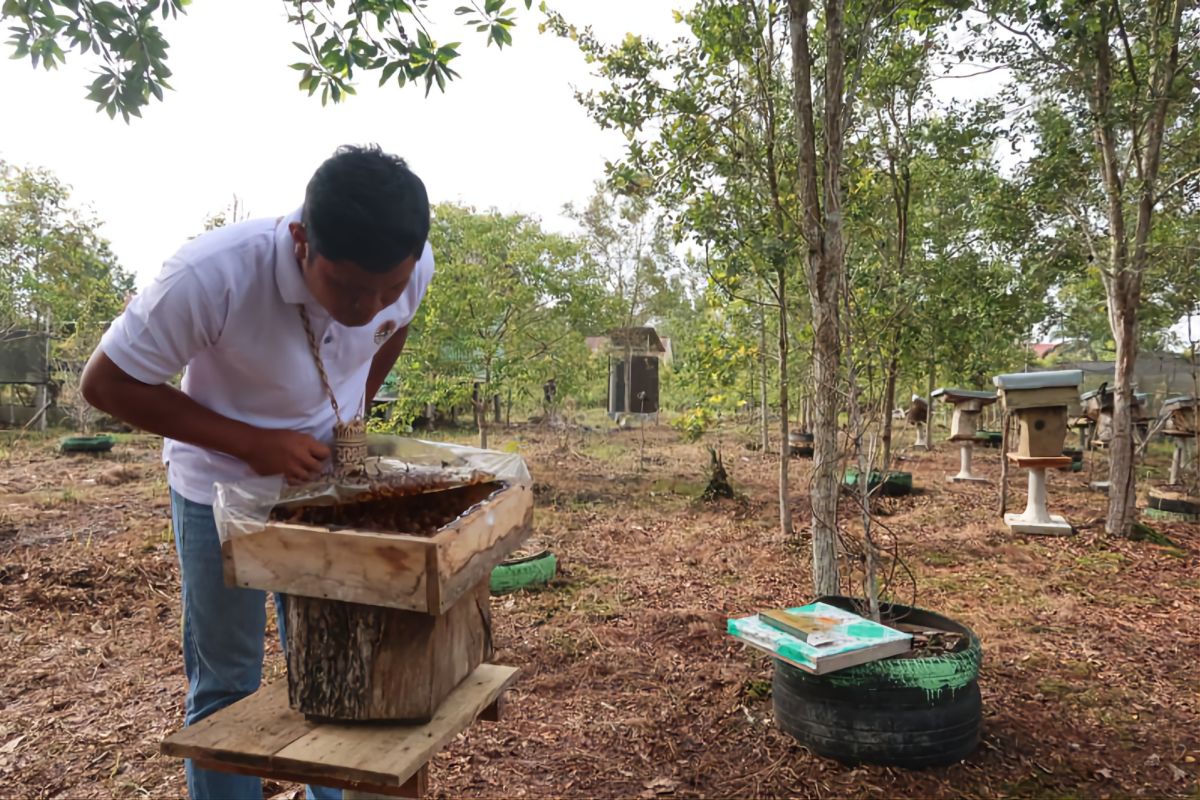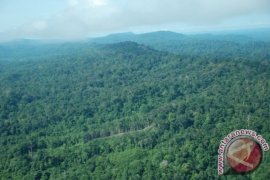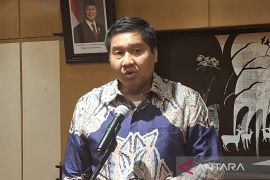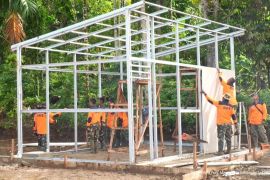Hunching slightly, he pulled off the layers of plastic covering the upper part of the bee hive box. He intently examined every corner of the Trigona itama bee hive to make sure its honey had formed perfectly.
“Kelulut bees do not sting, so do not hesitate to come closer. Its honey tastes sweet with a hint of sourness,” Sutoyo, chairperson of the Kelulut Honey Cultivation Social Forestry Business Group (KUPS), said in Tuwung village, Pulang Pisau district, Central Kalimantan, in mid-January 2024.
Tuwung village lies 40 kilometers outside of Palangkaraya, the capital of Central Kalimantan province. It is a one-hour journey from the capital city.
In 2015 and 2016, Tuwung village experienced wildfires, with thick smoke limiting visibility to two to three meters.
Now, the village supports the preservation of the region’s peatland hydrology. Wildfires no longer ravage the region’s forests and peatlands. Rambutan trees now thrive, producing ripe red fruit.
The Kelulut Honey KUPS is reaping the benefits of the well-preserved peat forest in Tuwung village. Village locals independently manage sustainable forests and produce dozens of liters of pure honey monthly.
Social Forestry
For Tuwung villagers, December 26, 2019, was a special day. On that day, the Ministry of Environment and Forestry (KLHK) issued a decree allowing the locals to manage the village’s forest, which spans 1,297 hectares in area, through the Village Forest Management Institution (LHPD).
Almost 50 percent of the village forest sat atop the management area that burnt in the 2015–2016 wildfires.
The forest management scheme was conducted participatively by LHPD for agroforestry activities through the 2020 National Economic Recovery (PEN) program. Tuwung Village LHPD has three business units: Kelulut Honey KUPS, Fishery KUPS, and Farming KUPS.
The Ministry of Environment and Forestry fully supported the village government by providing land for social forestry efforts and planting trees and fruit seeds in the village forest.
Related news: Sweetening Rantau Atas villagers' livelihoods with honey
Due to the cultivation of various trees and fruits, the forest is green again and enjoys a mutualistic relationship with kelulut honey bees.
Kelulut bees obtain food from almost all flowering plants, acting as the forest’s non-wood resource that harbors potential for economic growth, especially for villagers.
The Kelulut Honey Cultivation KUPS was established through the Decree of Tuwung Village Head Number 25 of 2023. The business group, which consists of 20 people, manages 100 bee hive boxes.
The group’s initial financing came from the central government’s allocation for PEN’s food agroforestry sector, which amounted to Rp200 million (approximately US$12,811) in 2020.
Meanwhile, Rp35 million (approximately US$2,241) in financing was sourced from the 2022 Village Budget (APBDesa) and Rp17.79 million (about US$1,139) from the 2023 Village Budget.
To support cultivation, the region’s Forestry Service also offered help in the form of productive economic aid for bee hive boxes and water separator machines.
Tuwung village produces about 15 liters of kelulut honey each month. The honey is sold at Rp25 thousand (approximately US$1.6) per 100 milliliters, generating a transaction value of Rp3.75 million (approximately US$240) per month, or Rp45 million (approximately US$2,882) per year.
Social forestry through the kelulut honey cultivation scheme has increased local villagers’ economic value, while the kelulut honey product, believed to boost body immunity, has become a popular souvenir from Central Kalimantan.
Global Recognition
Chief of the United States Forest Service, Randy Moore, looked elated when Environment and Forestry Minister Siti Nurbaya Bakar offered him a purun grass straw to sip kelulut honey from.
Moore noted the delicate taste of the sweet and sour honey. He licked the end of the purun grass straw that touched the bee hive to ensure no honey was left.
“I am full of hope, awe, and respect with what I see. Thank you for the opportunity to be here and witness what you have achieved,” he stated while visiting Tuwung village.
The smell of sour peatlands cut through the air. A gentle breeze blew on the leaves, shading the area of social forestry in the heart of Borneo.
Tuwung village’s success story — from being ravaged by fire to becoming a productive village — offered the American delegates new knowledge about a forest managed and kept by the locals.
The Indonesian government has looked to the United States for regulations and values regarding forest management and dealing with wildfires, as the superpower possesses vast forests and national parks.
“We learn about the forestry system from the United States, in which no one is allowed into the forest. No mosquito shall die, and no branch shall break,” Minister Bakar said.
However, the Indonesian government has adjusted to manage the forestry sector by strengthening access to social forestry. People are given access to the forest and facilities, knowledge, institutions, and financial aid to achieve economic prosperity.
Related news: BRIN devises method to extend honey shelf life to 419 days
Editor: Bayu Prasetyo
Copyright © ANTARA 2024










